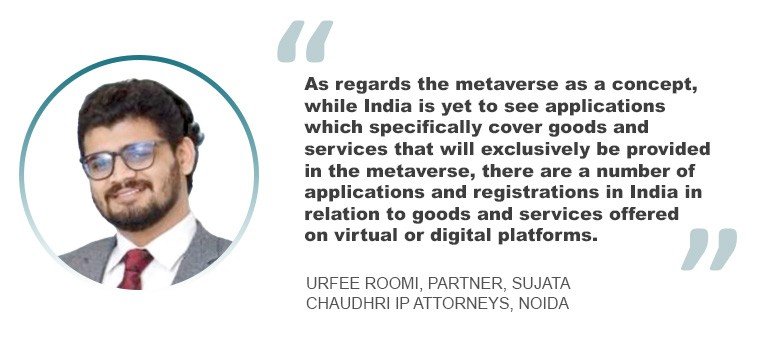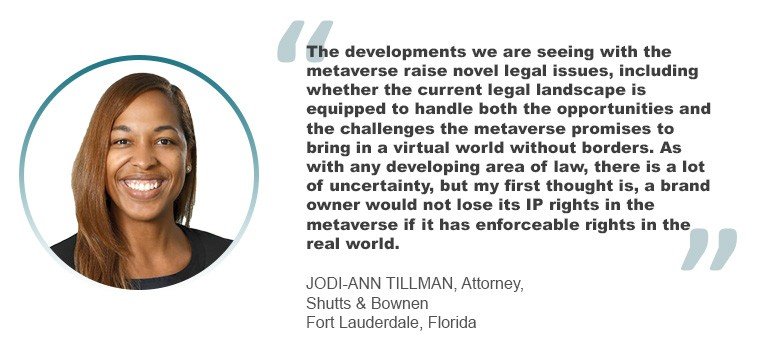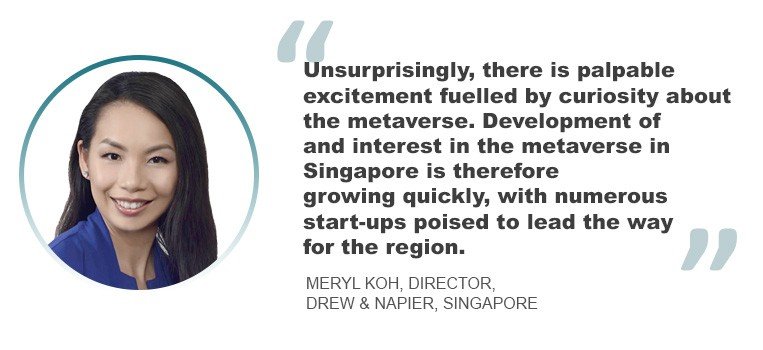Are Businesses and Legislation Ready for the Coming of the Metaverse?
31 March 2022

Unlike well-established social media platforms, the metaverse might not yet be a prevalent entity in most people’s everyday life, but that hasn’t deterred businesses from working to secure their own spot in this vast emerging new market. In fact, when it comes to IP, there are already a lot of goings-on in the virtual world. “Businesses are rushing at the opportunity to secure IP rights for their virtual goods and services,” said Jodi-Ann Tillman, an attorney at law at Shutts & Bowen in Fort Lauderdale, Florida. “Although the metaverse is still developing, it is generally understood to be a virtual environment where users can interact with each other across any number of interconnected virtual worlds. Tech giants like Microsoft, Meta (formerly Facebook) and the leading interactive entertainment company Epic Games are already introducing metaverse elements into their business models, and the development of metaverse is rapidly taking shape.”
Tillman notes that Microsoft is rolling out Mesh, a collaborative platform for virtual experiences, to the existing Microsoft Team’s platform where users will be able to “see, share, and collaborate on persistent 3D content.” Facebook’s rebranding as Meta solidifies its commitment to realize the company vision “to help bring the metaverse to life.” Epic obtained US$1 billion in new funding, including an additional US$200 million strategic investment from Sony Group to establish a metaverse of linked games and services. “Similarly, we are seeing other consumer facing brands jumping at the opportunity to enter the metaverse,” she said. “Indeed, high-end fashion houses like Gucci’s recent partnership with Roblox and Balenciaga with Fortnite for collaboration in virtual worlds are already becoming a common occurrence. As brand owners gain a deeper understanding of the metaverse, it is imperative they incorporate a future brand strategy that considers the metaverse.”
While global enterprises are gearing up to prepare for metaverse, if we shift our focus to Asia, we will also see a trend of welcoming the metaverse. Urfee Roomi, a partner at Sujata Chaudhri IP Attorneys in Noida, said: “From an Indian perspective, I note that the number of filings to register trademarks concerning the metaverse are increasing. Here, two aspects have to be considered, namely metaverse as a trademark, and metaverse as a concept. In relation to metaverse as a trademark (both word mark and design mark), the term itself has been granted registration in India in various classes recently. Further, there have been instances where businesses have started filing new applications for META-formative marks, to provide their goods as well as services in the metaverse.”
“As regards the metaverse as a concept, while India is yet to see applications which specifically cover goods and services that will exclusively be provided in the metaverse, there are a number of applications and registrations in India in relation to goods and services offered on virtual or digital platforms.” Roomi also shared an interesting example about the Indian movie Radhe Shyam having its trailer released through Spatial, a metaverse designed for cultural events. The premier of the trailer took place on a virtual cruise, attended by more than 90,000 online participants. Roomi said this could be considered a good starting point for exploring the extent of copyright in the metaverse. Meryl Koh, a director at Drew & Napier in Singapore, notes that “a large proportion of Singapore residents” are digital natives. “Unsurprisingly, there is palpable excitement fuelled by curiosity about the metaverse. Development of and interest in the metaverse in Singapore is therefore growing quickly, with numerous start-ups poised to lead the way for the region. A good example of this is the local startup Affyn, which is a company building a blockchain powered play-to-earn mobile game of the same name. With particular focus on developing a sustainable game economy, the start-up has recently raised over US$20 million through several fundraising rounds. Another Singapore-based start-up is BuzzAR, which is looking to lead the development in the metaverse in the Asia-Pacific region particularly in the areas of virtual reality, augmented reality, and user generating content.”
In line with these developments, she says, businesses here have started to secure IP rights, not just through the registration of their own proprietary IP, but also through the acquisition of IP which has been developed externally, such as BuzzAR’s recent acquisition of The Cooking Game VR, a virtual reality (VR) simulation game. Such moves enable businesses to build on already existing technology and fast-track the development of their products and/or services. Koh says that more of these kinds of acquisitions are likely to be seen as companies find ways to join up in order to accelerate the co-creation of the metaverse. As the metaverse develops, there will be IP disputes in connection with virtual goods and services. One notable example would be the case of Hermès International v. Mason Rothschild, pending in the United States District Court for the Southern District of New York. Tillman said: “Hermès has alleged that the defendant, Rothschild, is infringing its rights in the famous BIRKIN trademark by selling ‘MetaBirkins’ as digital assets in the form of non-fungible tokens (NFTs) in virtual worlds such as metaverse.”

In another case of IP infringement related to NTF, Nike sued StockX, an online marketplace mainly for sneakers, over its Vault NFTs, which are digital versions of Nike’s sneakers for which Nike owns the IP rights. “As of today, StockX has not yet responded to the allegations in Nike’s complaint,” she said. Both examples are recently filed cases, and to date there is yet to be any U.S. cases deciding the merits of a dispute of IP rights in the metaverse. “This is a developing area of law, and IP experts will be monitoring any changes in the legal landscape closer over the next several years,” Tillman said.
For India, disputes related to metaverse are yet to occur, Roomi said. “While, as of now, there have been no instances in which an Indian court has had the opportunity to consider a dispute in relation to the metaverse, given the surge in interest of stakeholders in India, we expect that there will be instances in which courts have to decide upon questions relating to the metaverse in the near future.”
Since India has seen a number of trademark applications being filed for the term ‘metaverse’, Roomi expects major disputes in the initial days to revolve around whether any one entity can claim monopoly over this term or whether it will be treated as a term common to trade. “The sphere of copyright law also has a lot of potential for disputes in India. While courts have not had the opportunity to consider the aspect of copyright infringement in a virtual environment in India, considering the fact that India has a line of judicial interpretation regarding personality rights as well as the fact that any kind of avatars can be developed in the metaverse, the possibility of such rights becoming a central issue of metaverse related disputes is likely.”
Similarly, Singapore has not yet witnessed any metaverse-related disputes. “At present, there do not appear to be any reported disputes in Singapore relating to the metaverse,” said Koh. “On a fundamental level, given that the metaverse is conceptually similar to other existing digital realities, like augmented reality, virtual reality, and even video games in general, we can expect similar disputes to arise. These would include disputes based on copyright law, trademark law or passing off, and arising from related licensing or contractual arrangements.” “Going a step further, the metaverse is said to distinguish itself from existing digital realities due to its persistent, interactive, interoperable, and potentially decentralized nature; and that, as such, people can one day ‘live’ in the metaverse, with its own decentralized currency and ecosystem. This gives rise to further potential areas of dispute.”
“For example, ‘living’ in the metaverse may entail the use of personal data, which would fall within the purview of privacy legislation, such as Singapore’s Personal Data Protection Act. Further, if people are allowed to use and customize personal avatars, it seems possible for a user to make unauthorized use of another person’s likeness. As the right of publicity, which is ‘image rights’ or ‘likeness’ rights, is not recognized in Singapore, aggrieved persons may have to turn to action in passing off or, in appropriate cases, defamation law.”

The use of decentralized currency and blockchain assets, including non-fungible tokens, are also subject to their own set of issues, in particular under securities law and copyright law, Koh says. As the development of the metaverse is still in the budding stage, IP laws are yet to be fully updated to cater to the new virtual space. “The remedies available for infringement in the metaverse, for example, are still unclear,” said Tillman, “It is too soon to tell if the current legal framework will effectively protect brand owners against infringers, although I believe changes in IP laws are inevitable with the ongoing development of the metaverse. It will be interesting to see how the courts handle litigation surrounding IP rights in the metaverse which will lay the foundation for brand enforcement in the metaverse.”
Roomi suggested that, in the meantime, lawyers can turn to traditional laws for protecting IP rights in the metaverse. He said: “While as of today, Indian IP law does not specifically protect IP rights in the virtual world, traditional concepts of intellectual property rights may be utilized to protect such rights, initially.”
Koh shared a similar view that current laws in Singapore can provide some sort of IP protection in the metaverse. She said: “IP rights in the virtual world will likely be governed principally by copyright law (under the recently promulgated Copyright Act 2021) and trademark law (under the Trademarks Act 2021 and the related common law tort of passing off). Additionally, personal data will likely be protected under the Personal Data Protection Act.”
Metaverse platforms and their IP policy
In addition to legislation, metaverse platformsthemselves may also need to take note of their IPpolicy, especially how they handle content generatedby users. “User generated content will certainly bea big issue that metaverse platforms may face goingforward,” said Roomi. “While Indian law provides forcertain protection for intermediaries, there is a lacuna as regards metaverse service platforms. Further, user generated content may lead metaverse platforms to end up in major litigation with brand owners, just because of the fact that the platform was utilized to conduct activities, that may infringe upon real world rights. Hence, in my opinion, metaverse platforms should, in order to avail the best possible protection under the law as it stands currently, ensure that all requirements to avail protection provided under Indian law are followed.”
“Further, from a technological point of view, metaverse platforms may utilize advancements such as smart contacts to reflect the uniqueness that is protected by IP statutes in the real world. In this way, platforms can ensure that only the right holders will be able to create certain products in the metaverse, which in effect may reduce infringement issues in the metaverse.”
Koh highlighted the necessity for metaverse platforms to clarify the rights of users. “Metaverse platforms will likely find themselves in similar positions to platforms such as YouTube and TikTok,” she said. “First, the issue arises as to the allocation of proprietary rights between metaverse platforms and their users, especially since digital platforms now provide opportunities for people to turn content creation into a livelihood. To facilitate this, metaverse platforms should consider ensuring that their terms of use or services preserve, or otherwise make clear the rights of users in respect of the content they create.” “Second and more importantly, the interactive nature of the metaverse suggests that users en masse will be empowered to create content, which also comes with it significant exposure to liability should such content infringe upon the rights of others. On the copyright front, metaverse platforms can explore obtaining blanket licenses from, for example, international record labels and music publishing companies, which may be beneficial for key metaverse stakeholders. On the trademark front, metaverse platforms may consider resources or tutorials to educate users on the dos and don’ts of content creation. More generally, metaverse platforms may wish to implement robust reporting and swift takedown procedures to copyright owners and trademark proprietors with avenues for recourse, without having to resort to often expensive and acrimonious legal action.”
Tillman compared IP rights in the metaverse with how we cope with IP currently in the real world. “Currently, we are seeing brands license the use of a real-world goods in video games; a similar concept should exist for the metaverse,” she said. “I think in an ideal world, regulating content should be somewhat consistent with what we see today. Metaverse platforms should implement policies against violating third-party IP rights and should enforce them to the full extent they can. That way, brand owners can readily rely on their trademark registrations and other IP rights for real world goods and services to effectuate takedowns in a virtual world, especially where the virtual world owners are U.S.-based.”

Which law governs in the metaverse?
One challenge in IP and the metaverse is easy to foresee: where rights are territorial, which law governs in the metaverse?
Tillman offered advice to brand owners concerned about their IP rights in metaverse. “The developments we are seeing with the metaverse raise novel legal issues, including whether the current legal landscape is equipped to handle both the opportunities and the challenges the metaverse promises to bring in a virtual world without borders,” she said. “As with any developing area of law, there is a lot of uncertainty, but my first thought is, a brand owner would not lose its IP rights in the metaverse if it has enforceable rights in the real world.”
“I do agree with Cathy Hackl, chief metaverse officer and CEO of Futures Intelligence Group, a metaverse focused consulting agency, who said that every brand and company will need a metaverse strategy,” Tillman said. “Some IP experts question whether there is any value in securing registrations now for the virtual equivalent of a brand owner’s real world goods or service. While I believe brand owners’ IP rights will be enforceable to some extent in the metaverse, if the metaverse is the future of the internet, there is no better time than now to start protecting virtual trademark rights. Having an enforceable trademark in connection with virtual goods and services will allow brand owners to combat infringement and more effectively enforce their rights in the metaverse when the time comes.”
At a minimum, she says, brand owners planning to have a presence in the metaverse should register their trademarks for use in connection with virtual goods and services in the U.S. and other interested jurisdictions. And as always, they should continue monitoring new filings and pending third-party trademark applications for potentially infringing marks.
Koh says that Singaporean enterprises will have an advantage in establishing their presence in the metaverse. She said: “There is no doubt that the metaverse – should it become as ubiquitous as its proponents aspire it to be – would bring IP challenges that are unprecedented in both complexity and scale. While the road ahead is uncertain, local businesses and authorities are ready to face the difficulties that the metaverse might pose.
Businesses in Singapore have always been known to be early adopters of technology compared to their regional counterparts. They are therefore adept in navigating new and unchartered waters, and will no doubt rise up to the IP challenges brought by the metaverse when it is scaled up.” The same can be said for local authorities in Singapore, who Koh believes will no doubt rise to the occasion. “We can be assured that the Singapore government has its ears on the ground and is following these developments closely. It should be noted that Singapore was one of the first to implement legislation to regulate the cryptocurrency industry even though it was – and arguably still is – in its nascency. We can expect them to move with haste with respect to IP developments in the metaverse as well.”






